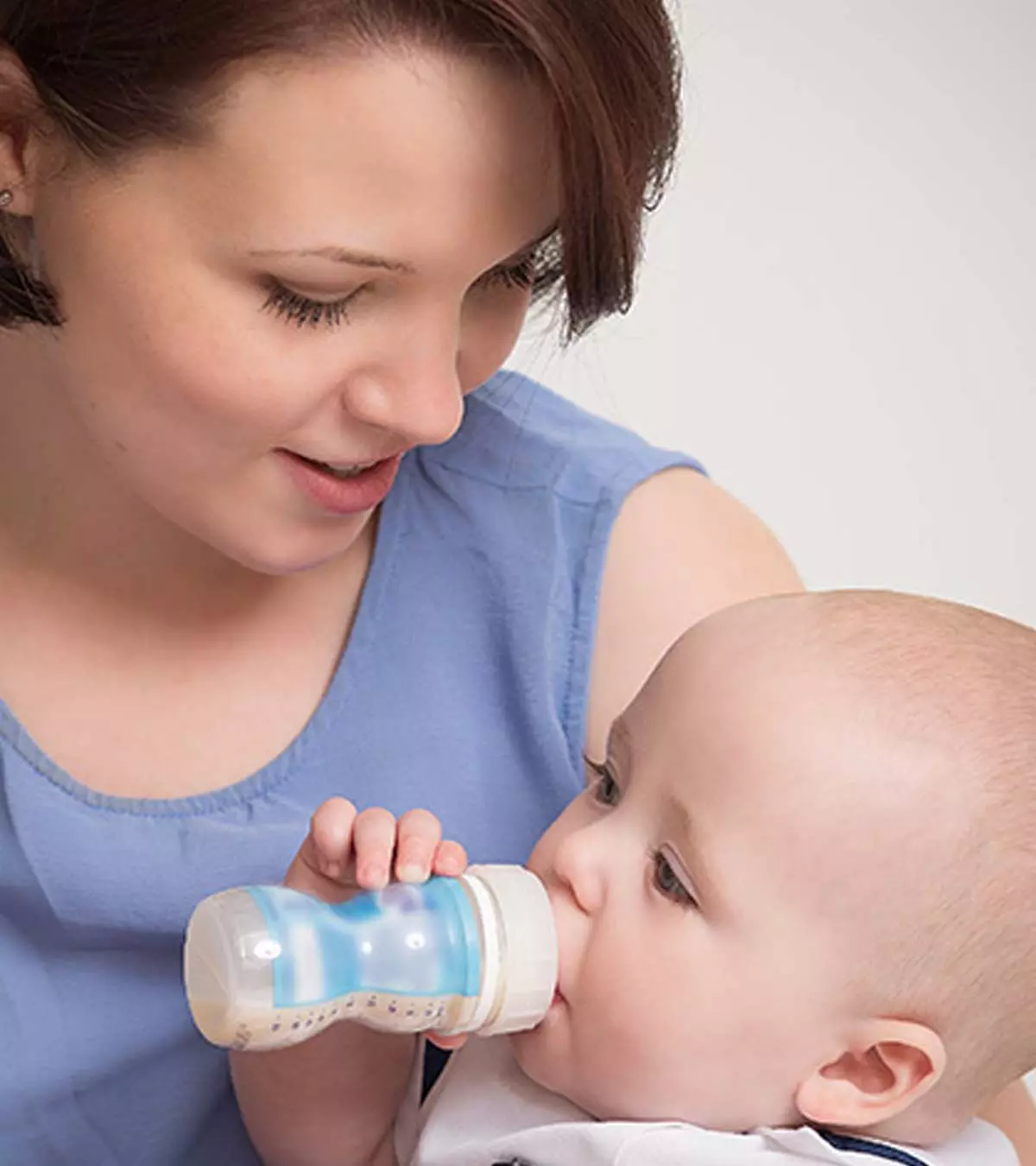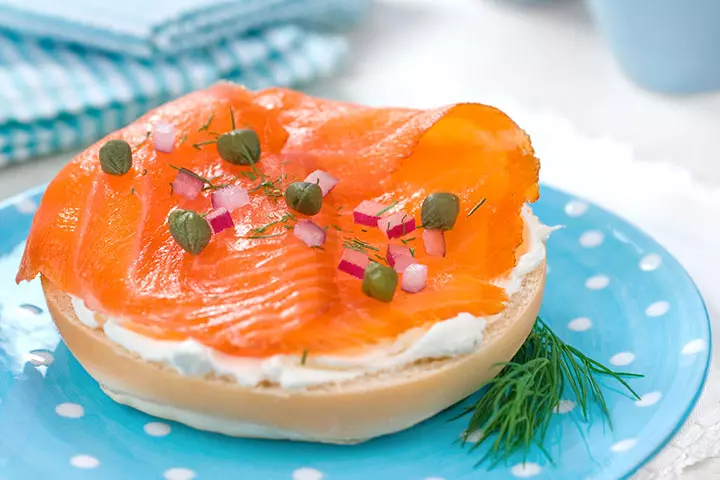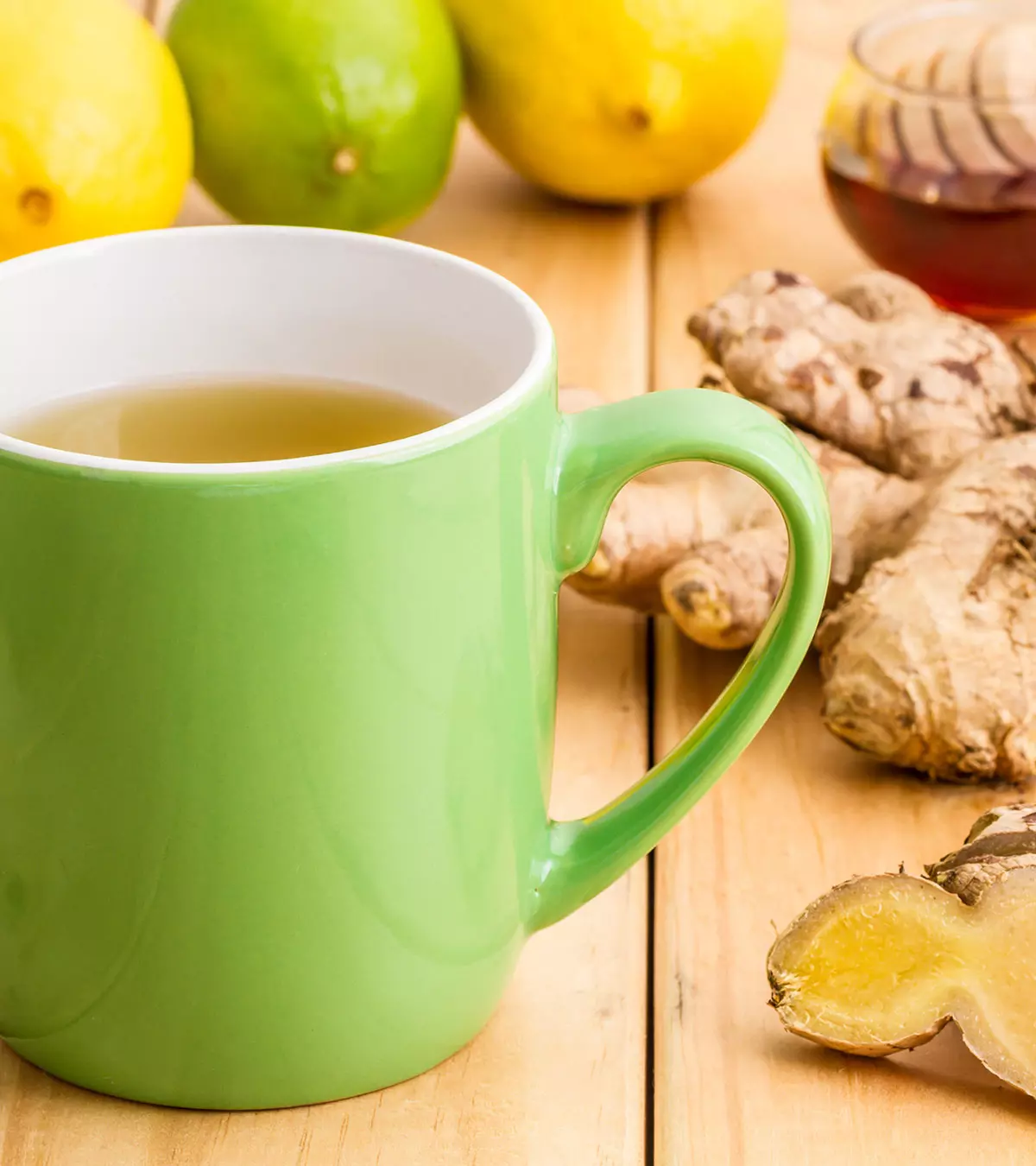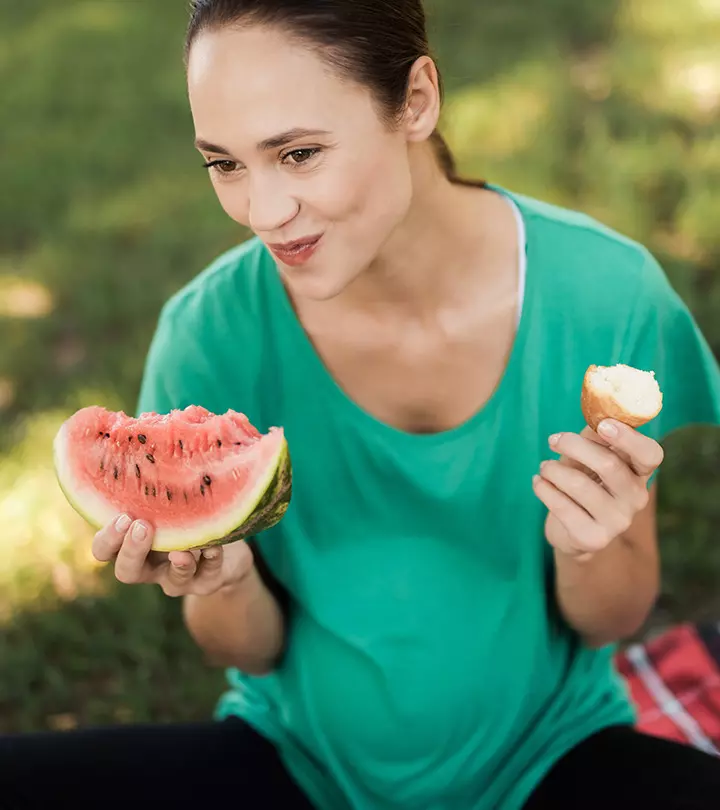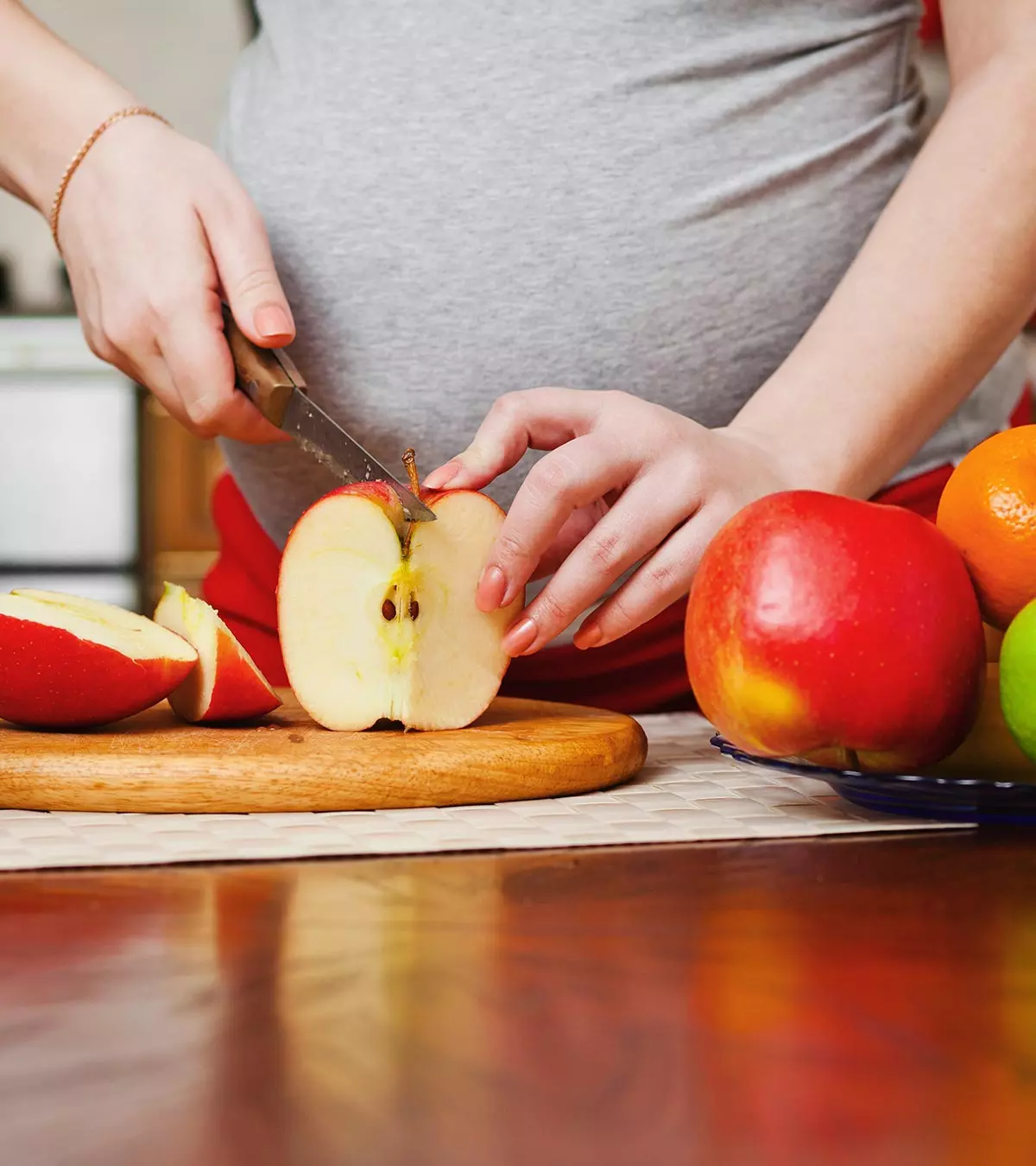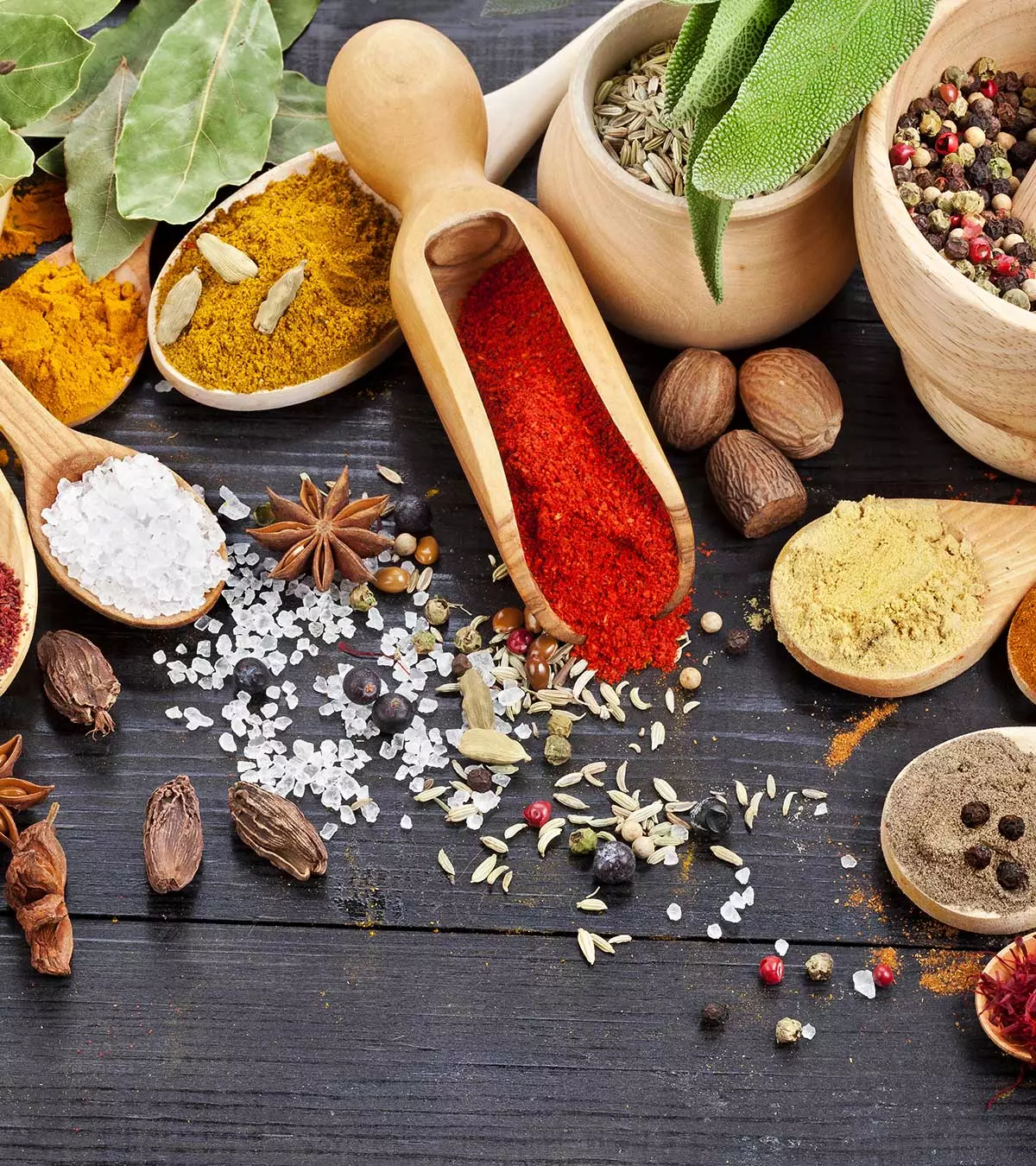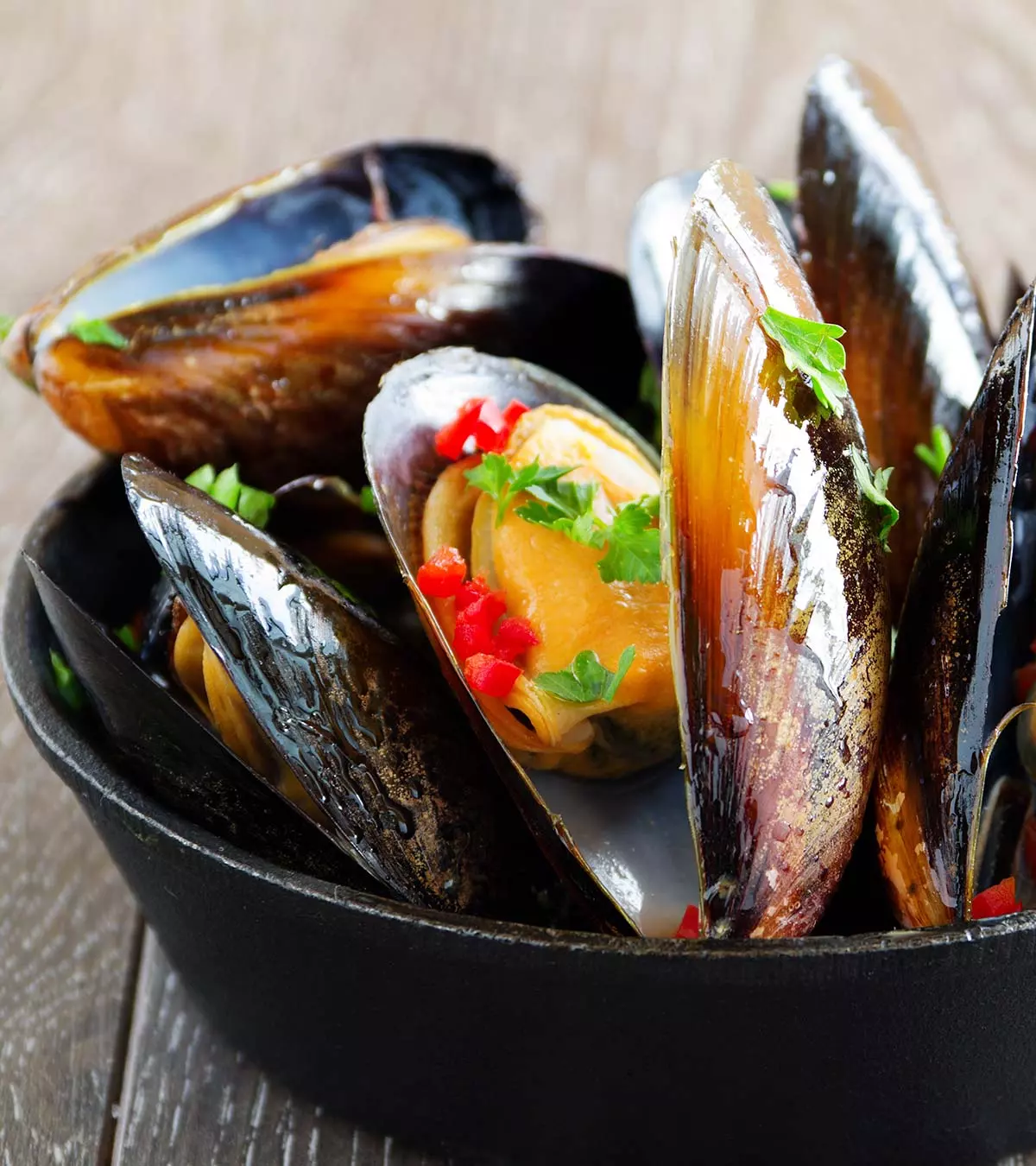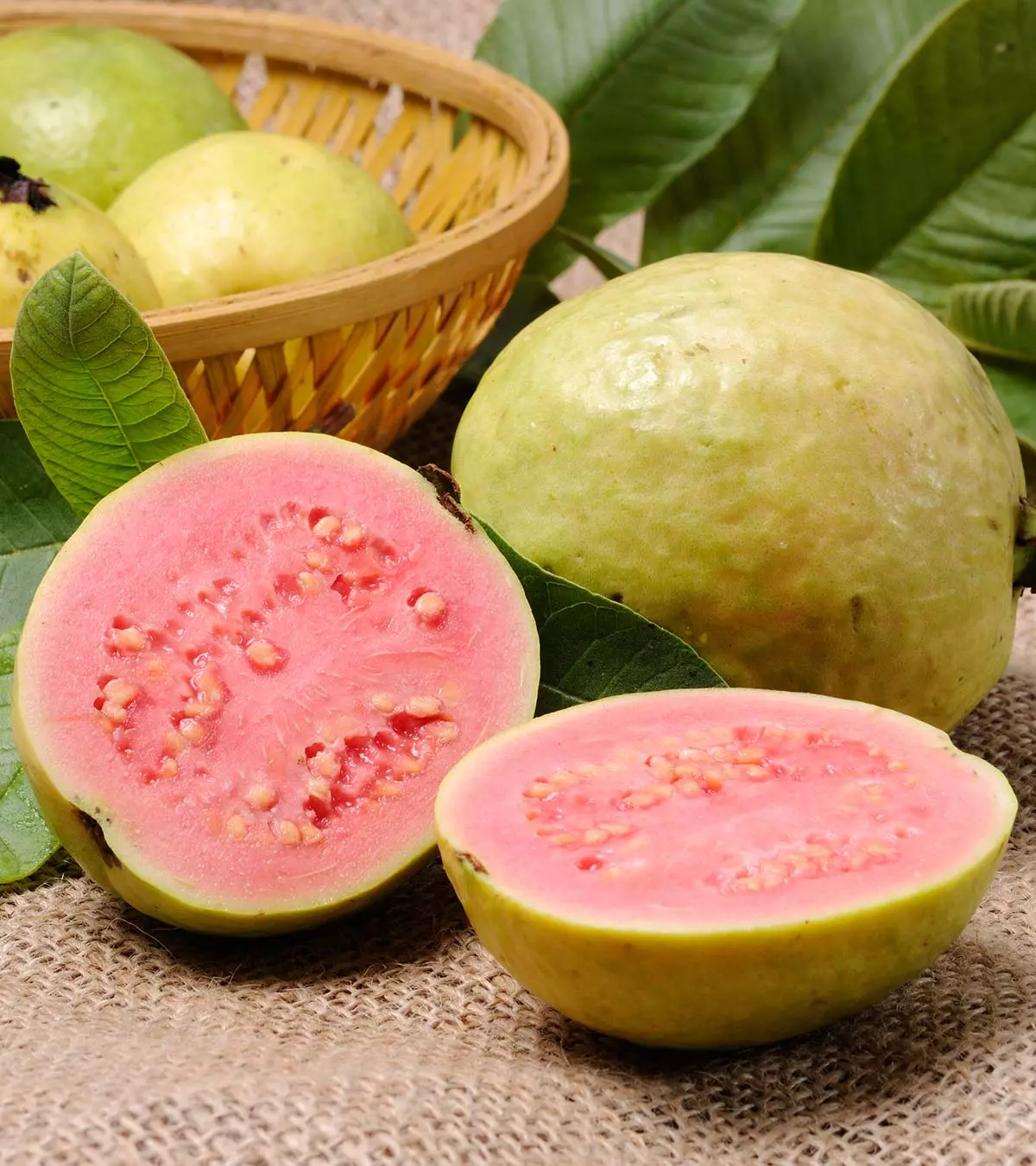
Image: Shutterstock
Guava (Psidium guajava) is a tropical fruit people consume worldwide for its medicinal properties. The health benefits of guava for babies are numerous, and it contains several nutrients and bioactive compounds that promote long-term health.
Different parts of the guava plant possess antimicrobial and possibly anticancer properties (1). However, knowing the right age and age-appropriate ways to feed guava to your baby is important.
Keep reading to learn more about whether it is safe for babies to consume guava, its nutritional value, possible health benefits, and side effects. It also provides some easy guava recipes you can make for your baby.
Key Pointers
- Guava is a highly nutritious fruit found worldwide, known for its medicinal and health benefits.
- It contains essential nutrients such as vitamin C, antioxidants, folic acid, and dietary fiber.
- Guava can benefit infants by boosting their immunity and supporting their vision and brain development.
- However, it is recommended to introduce guava to infants only after they are six months old and in small quantities in a soft and easily digestible form.
Is Guava Safe For Babies?
Yes, guava is safe for infants and may add to your infant’s nutrition. The U.S. Food and Drug Administration refers to guava as Generally Recognized As Safe (GRAS) for consumption (2). However, give it in moderation. Also, make it a part of a balanced diet instead of giving it as a standalone food.
The American Academy of Pediatrics (AAP) recommends starting weaning food once your baby displays signs of readiness. Feed a variety of baby-led weaning foods with continued breastfeeding at least until the baby turns a year old (3).
At What Age Can Babies Start Eating Guava?
Babies can have guava by the age of six months. This is a safe age as the baby starts eating other complementary foods such as rice and potato. However, as you introduce guava, start with a fruit puree for babies to ensure it’s easy to digest. Gradually transition to soft, cooked guava as your baby gets used to the taste and texture. You might also consider offering mashed guava (peeled and deseeded) as an alternative.
Do not give guava juice to your baby as babies younger than one year are not recommended fruit juices (4).
Nutritional Value Of Guava
The flesh of guava ranges from pink, white, and yellow to red. It is rich in essential micronutrients such as vitamins A, B, E, and C, folic acid, phytochemicalsiNatural chemicals produced by plants that help prevent diseases and promote good health. , aminoacidsiChemical substances that combine to form proteins, crucial for major bodily processes , dietary fiber, and minerals like magnesium, phosphorus, iron, manganese, potassium, and copper (1). Besides, it is also known to have certain bioactive compounds, which have health-promoting effects.
Below is the nutritional composition of one raw guava (55g) with recommended dietary values for each nutrient (5) (6).
 Nutrition fact
Nutrition fact| Name | Amount | RDA |
|---|---|---|
| Water | 44.4g | – |
| Energy | 37.4kCal | – |
| Carbohydrate, by difference | 7.88g | – |
| Fiber, total dietary | 2.97g | – |
| Sugars, total including NLEA | 4.91g | – |
| Calcium, Ca | 9.9mg | 270mg (7-12 months) |
| Iron, Fe | 0.143mg | |
| Magnesium, Mg | 12.1mg | 75mg (7-12 months) |
| Phosphorus, P | 22mg | 275mg (7-12 months) |
| Potassium, K | 229mg | 700mg (7-12 months) |
| Sodium, Na | 1.1mg | 200mg (7-12 months) |
| Zinc, Zn | 0.127mg | 5mg (7-12 months) |
| Copper, Cu | 0.127mg | 0.6-0.7mg (7-12month) |
| Vitamin C, total ascorbic acid | 126mg | 35mg (7-12 months) |
| Thiamin | 0.037mg | 0.3mg/1000Kcal |
| Riboflavin | 0.022mg | 0.5mg (7-12 months) |
| Niacin | 0.596mg | 6mg (7-12 months) |
| Vitamin B-6 | 0.061mg | 0.6mg (7-12 months) |
| Folate, total | 27µg | 35µg (7-12 months) |
| Choline, total | 4.18mg | – |
Sources: U.S. Department of Agriculture and World Health Organization
Health Benefits Of Guava For Babies
Moderate yet regular consumption of guava allows the baby to reap the following health benefits from the fruit.
- Good for digestive health: A research study published in the British Journal of Nutrition showed that dietary fiber and phenolic compoundsiAntioxidant compounds naturally and widely found in foods derived from plants and animals in guava could promote good intestinal health (7). The dietary fiber present in the fruit also helps healthy bowel movement and keep constipation at bay. Its high water content aids digestion and hydration.

- Helps gut bacteria: The peel and pulp of guava contain antioxidant dietary fiber (8). Guava’s dietary fiber has shown potential to support the gut microfloraiA group of microorganisms that colonize the gut and promote digestive and overall health. (9). A robust gut microflora helps in the proper absorption of nutrients.
 Point to consider
Point to consider- Boosts immunity: The fruit has high amounts of vitamin C and other valuable bioactive compounds such as carotenoidsiColored pigments found in plant-based foods that act as a precursor in the synthesis of vitamin A that could help in boosting immunity due to their antioxidative effects (10) .
- Supports vision: Regular consumption of carotenoids in the diet could support vision development (11). Guava is a good source of carotenoids, which could help maintain healthy vision and have protective effects over macular degenerationiAn eye disease that affects an individual’s central vision and may gradually lead to a loss of vision. , in the long run (12).
- Brain development: Guava has good amounts of vitamin A that could help in brain development (13). It also has other important micronutrientsi Essential nutrients, including vitamins and minerals that the body requires in low quantities. such as vitamin B1, B3, and B6 that are also good for the brain (14).

- Neuroprotective effects: The pulp of the fruit contains a carotenoid called lycopene with more of the compound found in pink-fleshed guava (15). Lycopene has shown protective effects against neurodegenerationiA gradual disintegration of neurons and nerve cells that impairs the proper functioning of the brain and the body , in the long run (16).
- Improves overall health: Guava possesses several health benefits that are attributed to its anti-viral and anti-inflammatory activities. Its extract shows antinociceptive (pain suppression) activity and is also effective against inflammation. The high content of organic and inorganic compounds like polyphenols are also beneficial to the skin (17).
Regular consumption of guava can be beneficial, but one should be aware of its potential side effects as well.
Side Effects Of Guava For Babies
The use of guava leaf extract or guava supplements for babies is not considered safe. Pediatric consultation and approval is a must for using these products. However, for guava fruit, no adverse effects or risks are documented except guava allergy.
Guava allergy is uncommon yet possible (18). Therefore, practice caution while feeding guava to your baby, especially if they have any existing allergies. However, avoid feeding guava at bedtime as it increases energy levels and may cause disturbed sleep .
Precautions To Take While Feeding Guava To Babies

Consider the following points when feeding guava to your baby.
- Give soft, cooked, and mashed or pureed guava in the beginning.
- Offer small quantities, i.e., one to two teaspoons initially. Once your baby is comfortable, you may gradually increase the quantity.
- Guava contains small seeds that can be hard to digest for infants. Therefore, remove the seeds when you make a pulp or puree.
- Go slow in the beginning. Follow the three-day wait rule. This will help you determine if guava is suitable for your baby. Meanwhile, do not introduce any new food to your infant.
- If your baby shows any signs of discomfort after eating guava, then stop feeding the fruit. Consult a doctor before serving guava to the baby again.
- Guava is acidic, largely due to malic and citric acid and excessive consumption might cause stools to become acidic as well. This may cause a diaper rash. Therefore, serve guava in moderation.
In the next section, we suggest some tasty guava recipes for your baby.
 Quick tip
Quick tipGuava Recipes For Babies
Prepare various recipes with guava depending on the age of the baby. Below are some recipes that you might like to try.
1. Mixed guava puree
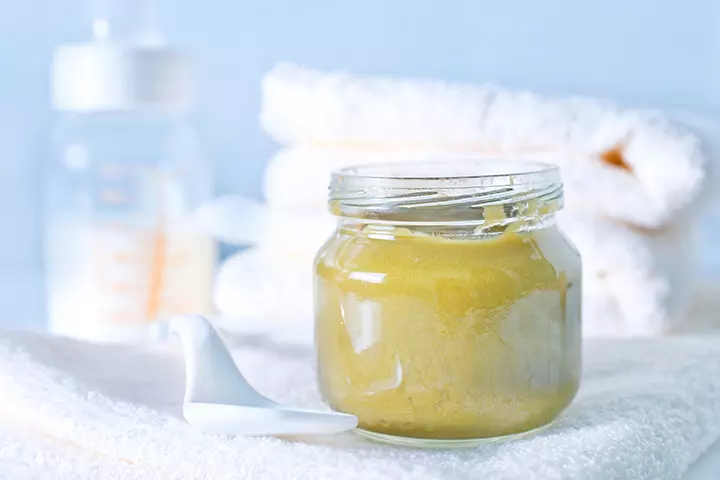
This is an ideal recipe for babies between the ages of six to eight months. The puree is highly nutritious with abundant vitamin C and other valuable nutrients.
You will need:
- 1 guava (mashed)
- 1 kiwi (chopped)
How to:
- Take the chopped vegetables. Deseed them and then make a puree.
- Mix guava and kiwi puree together.
- Serve it to your baby as a midday snack.
2. Oats guava porridge

You can serve this baby porridge as breakfast. It will provide umpteen soluble fiber from oats and valuable micronutrients from guava to support your baby’s needs well.
You will need:
- 1 cup oats
- 5 cups water
- 1 cup milk
- 1 guava, ground to a paste
- Jaggery powder, to taste
- 1tbsp dry fruit powder (optional)
How to:
- Take a thick bottom pan and put it on medium flame. Add water into it and let the water boil.
- Now soak the oats in the boiling water for five minutes.
- Cook the oats well. When they are done, they look mushy.
- Now add milk and jaggery. Cook for three to four minutes and add the guava paste.
- Mix the paste well with the oats. Lower the flame, cover the pan with the lid and let the oats simmer for two to three minutes.
- Transfer the porridge to a bowl. Sprinkle some dry fruit powder and serve.
3. Guava and banana smoothie
This nutritious drink may be a great accompaniment to your baby’s dinner or snack.
You will need:
- 1 ripe guava, peeled and chopped
- 1 ripe banana
- 1/2 cup yogurt
How to:
- Wash, peel, deseed, and cut the guava into small pieces.
- Peel and slice the banana.
- Blend the chopped fruits and yogurt until smooth.
- If desired, sieve the mixture for a finer texture, then pour it into a cup and serve.
Frequently Asked Questions
1. Can guava be given to babies with diarrhea?
Guava is generally safe to give to babies with diarrhea. However, the safety of any food item in such cases depends on the underlying cause of diarrhea. Therefore, check with a pediatrician for advice based on the cause of diarrhea in the baby.
2. Can guava be given to babies with a weak immune system?
Guava is safe for babies with weak immune systems. The rich antioxidant content of the fruit might even benefit the immune system.
3. Can guava be given to babies with colic?
Guava is usually safe for babies with colic. If you are unsure how your baby may respond to the new fruit, check with a pediatrician first.
4. Can guava be given to babies with eczema?
Infants and children with eczema can usually safely consume the fruit. However, you may want to avoid serving the fruit if your baby has eczema and food allergies or shows exacerbated eczema symptoms after consuming new foods. In such cases, you may introduce the fruit in small quantities over time after taking the doctor’s approval.
5. Can guava be given to babies with a cold or cough?
Guava is safe to serve to babies with colds and coughs. If your baby has these conditions due to serious underlying problems, then consult a pediatrician first.
6. Can guava be given to babies with a fever?
There are no contraindications to serving guava to babies with fever. It may not be suitable for babies with fever due to certain complex medical conditions. In such cases, check with a doctor first.
7. Can guava be given to babies with diabetes?
Guava can benefit diabetes as it has a low glycemic index and load, preventing blood glucose spikes. Research has shown that guava consumption can regulate blood glucose levels (26). Nevertheless, it is advisable to consult a healthcare provider before introducing guava to babies with diabetes.
8. Can guava be given to babies with high blood pressure?
Guava is safe to consume for those with high blood pressure. However, if your baby is on any blood pressure medications, check with a doctor first to prevent any cross-reactions.
In addition to these recipes, you may also incorporate guava in their desserts, baby smoothies, or milkshakes and add variety to your baby’s diet. Guava for babies can be a nutritious addition to their diet after six months. You can mash into their soft diet to make it easier to swallow as big chunks may pose a choking hazard. It contains various vitamins and bioactive components that help support your baby’s general health. It also has several health benefits for babies, including enhanced digestion, vision, and immunity. However, remember to feed your baby the fruit in moderation and avoid giving little guava seeds. Also, don’t use it as a sole source of nutrition for your infant. Instead, incorporate it into your baby’s well-balanced diet daily.
Infographic: Health Benefits Of Guava For Babies
It is important that you include certain fruits in your little one’s diet to help them get the essential nutrients and benefits required for growth. One such fruit you should include in the list is guava. In the following infographic, we bring you a few advantages that giving guava to your baby can have. So read on and keep the list handy. Illustration: Momjunction Design Team
Illustration: Health Benefits Of Guava For Babies
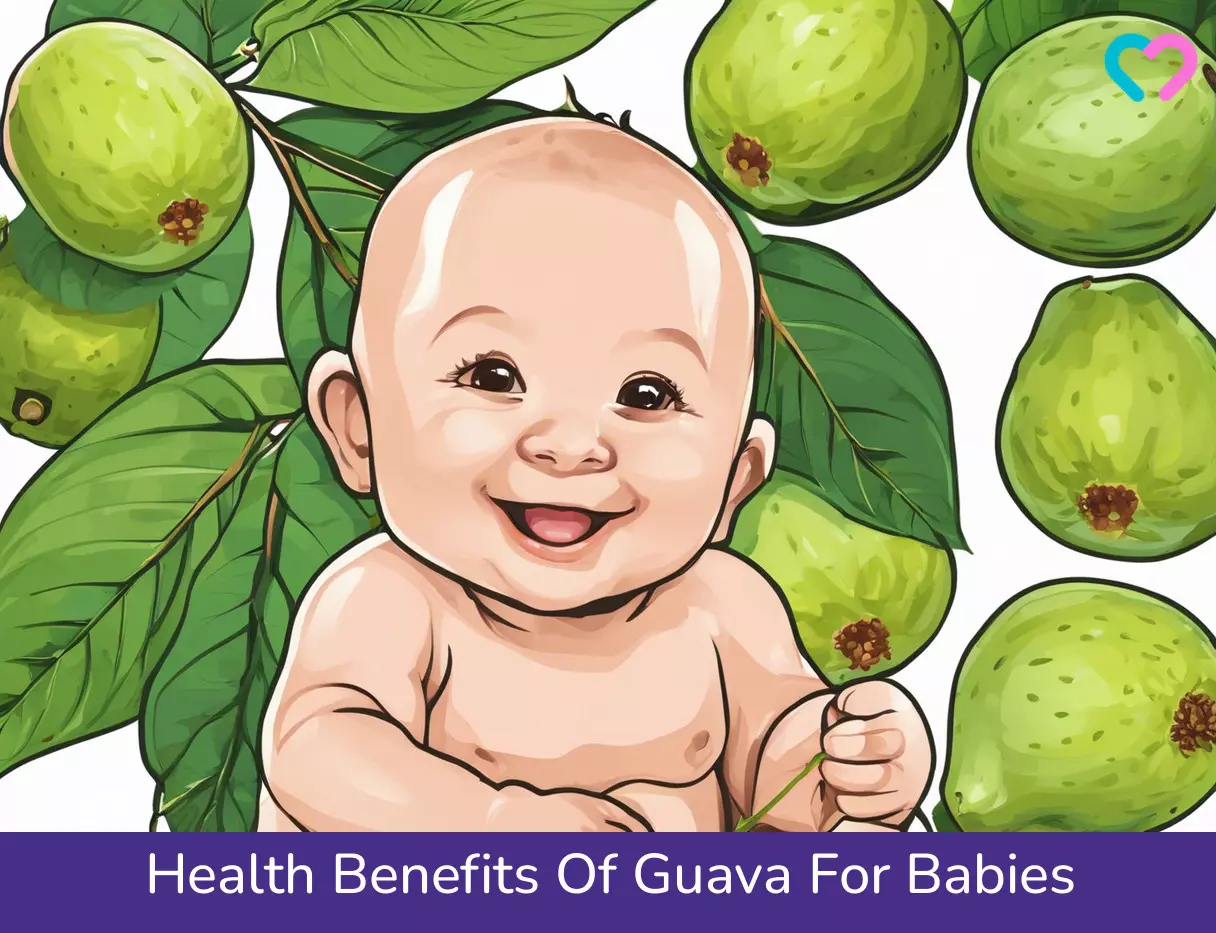
Image: Stable Diffusion/MomJunction Design Team
Explore the remarkable health advantages of guava fruit and its possible adverse reactions. Discover the ways this delightful fruit enhances well-being and boosts your health.
References
1. Poonam G. Daswani et al.; Psidium guajava: A Single Plant for Multiple Health Problems of Rural Indian Population; National Center For Biotechnology Information
2. CFR – Code of Federal Regulations Title 21; FDA
3. Starting Solid Foods; Healthy Children; American Academy of Pediatrics
4. AAP Recommends No Fruit Juice for Children Under 1 Year; AAP
5. Guava, raw (341568); Food Data Central; USDA
6. Feeding and nutrition of infants and young children; WHO
7. E. Quiros-Sauceda et al.; Dietary fiber and phenolic compounds as functional ingredients: Interaction and possible effect after ingestion; Researchgate
8. Jimenez-Escrig et al., Guava fruit (Psidium guajava L.) as a new source of antioxidant dietary fiber.; Journal of Agriculture and Food Chemistry
9. Jiefen Cu et al.; Dietary Fibers from Fruits and Vegetables and Their Health Benefits via Modulation of Gut Microbiota; Wiley Online
10. Oliveira Dda S et al.; Carotenoids and Vitamin C during Handling and Distribution of Guava (Psidium guajava L.), Mango (Mangifera indica L.), and Papaya (Carica papaya L.) at Commercial Restaurants.; National Center For Biotechnology Information
11. Jonathan R Mein et al.; Biological activity of lycopene metabolites: implications for cancer prevention; National Center For Biotechnology Information
12. Maneli Mozaffarieh et al.; The role of the carotenoids, lutein and zeaxanthin, in protecting against age-related macular degeneration: A review based on controversial evidence; National Center For Biotechnology Information
13. Christopher R. Olson and Claudio V. Mello; Significance of vitamin A to brain function, behavior and learning; National Center For Biotechnology Information
14. What are the health benefits of Guava?; Researchgate
15. Vijayanand Pasupuleti and Shyamrao Gururao Kulkarni; Lycopene fortification on the quality characteristics of beverage formulations developed from pink flesh guava (Psidium guajava L.); National Center For Biotechnology Information
16. John W. Erdman, Jr.; Are the health attributes of lycopene related to its antioxidant function?; National Center For Biotechnology Information
17. Sumra Naseer et al.; The phytochemistry and medicinal value of Psidium guajava (guava); Springer
18. Elham Hossny et al.; Challenges of managing food allergy in the developing world; Science Direct
19. Irene Yang et al.; The Infant Microbiome: Implications for Infant Health and Neurocognitive Development; NCBI (2017)
Community Experiences
Join the conversation and become a part of our nurturing community! Share your stories, experiences, and insights to connect with fellow parents.
Read full bio of Seeemaa Budhraja
Read full bio of Swati Patwal
Read full bio of Rohit Garoo
Read full bio of Ghazia Shah






